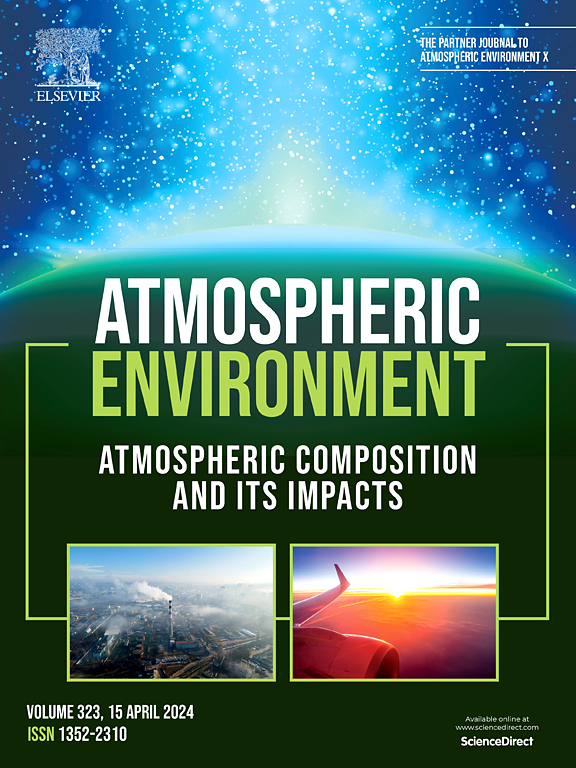规划合理的绿化可改善城市空气质量--模拟气流和污染物沉积变化的影响
IF 4.2
2区 环境科学与生态学
Q2 ENVIRONMENTAL SCIENCES
引用次数: 0
摘要
植被通过改变气流和污染物沉积过程影响城市空气质量。我们将植被影响动态评估模型(VIDA)与大埃迪模拟模型 PALM 相结合,对这些相互作用进行了研究。我们的分析重点是当地范围内的二氧化氮(NO₂)和颗粒物(PM)浓度,并考虑了三种树属。我们的研究结果表明,由于气态污染物和颗粒物在叶片上的沉积机制不同,因此有必要将它们分开计算。PALM-VIDA 耦合模型显示,如果将植被上的沉积物考虑在内,整个建模域和街道峡谷内的可吸入颗粒物水平会显著降低。通过沉积到植被上减少的 NO₂ 较少,但如果树种的选择和摆放能对气流产生理想的影响,仍可减少人类的 NO2 暴露。稀疏的树木排列或树冠稀疏的树种有利于通风,与沉积物较高但对通风有负面影响的茂密植被相比,稀疏的树木排列或树冠稀疏的树种通常能更好地降低街道峡谷中的二氧化氮浓度。我们的研究为城市规划和绿色基础设施设计提供了信息,强调了城市绿化在空气污染缓解战略中的多方面作用。研究的主要结论是,要准确评估城市树木对当地空气质量的影响,必须同时考虑沉积过程以及空气混合和通风的影响。考虑不周的位置和树种选择可能会导致树下污染物的净增加。不过,精心规划可以解决这一风险,从而改善整体空气质量。本文章由计算机程序翻译,如有差异,请以英文原文为准。
Well-planned greenery improves air urban quality - Modelling the effect of altered airflow and pollutant deposition
Urban air quality is influenced by vegetation through alterations in airflow and pollutant deposition processes. We investigated these interactions by integrating the Vegetation Impact Dynamic Assessment model (VIDA) with the Large-Eddy Simulation model PALM. Our analysis focus on nitrogen dioxide (NO₂) and particulate matter (PM) concentrations at the local scale, considering three tree genera. Our findings reveal the necessity of accounting for both gaseous pollutants and particles separately due to their differing mechanisms of deposition onto leaves. The coupled PALM-VIDA model demonstrates a significant reduction in PM levels across the modelling domain and within street canyons when deposition to vegetation is incorporated. Reduction in NO₂ through deposition to vegetation is lower but human NO2 exposure can still be decreased if tree species selection and placement leads to desirable effects on air flow. Sparse tree arrangements or species with sparse crowns facilitate ventilation and are often better at reducing NO₂ concentrations in street canyons compared to denser vegetation with higher deposition but negative effects on ventilation. Our study informs urban planning and green infrastructure design, underscoring the multifaceted role of urban greenery in air pollution mitigation strategies. Its main conclusion is that both deposition processes and the influence of air mixing and ventilation need to be considered to accurately assess the effects of urban trees on local air quality. Ill-considered placement and species selection may cause a net increase in pollutants underneath the trees. However, careful planning can address this risk and instead improve overall air quality.
求助全文
通过发布文献求助,成功后即可免费获取论文全文。
去求助
来源期刊

Atmospheric Environment
环境科学-环境科学
CiteScore
9.40
自引率
8.00%
发文量
458
审稿时长
53 days
期刊介绍:
Atmospheric Environment has an open access mirror journal Atmospheric Environment: X, sharing the same aims and scope, editorial team, submission system and rigorous peer review.
Atmospheric Environment is the international journal for scientists in different disciplines related to atmospheric composition and its impacts. The journal publishes scientific articles with atmospheric relevance of emissions and depositions of gaseous and particulate compounds, chemical processes and physical effects in the atmosphere, as well as impacts of the changing atmospheric composition on human health, air quality, climate change, and ecosystems.
 求助内容:
求助内容: 应助结果提醒方式:
应助结果提醒方式:


